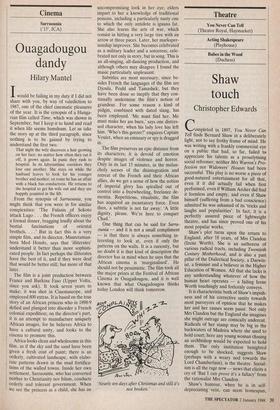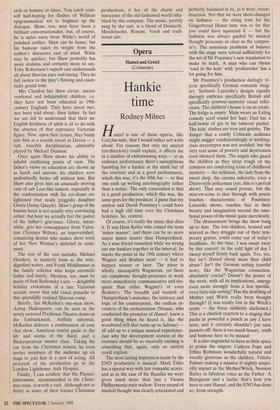Theatre
You Never Can Tell (Theatre Royal, Haymarket) Acting Shakespeare (Playhouse) Babes in the Wood (Duchess)
Shaw touch
Christopher Edwards
Completed in 1897, You Never Can Tell finds Bernard Shaw in a deliberately light, not to say frothy frame of mind. He was writing with a frankly commercial eye on a public that had, so far, failed to appreciate his talents as a proselytising social reformer; neither Mrs Warren's Pro- fession nor Widowers' Houses had been successful. This play is no worse a piece of good-natured entertainment for all that, even if it did actually fail when first performed, even if William Archer did find it formless and empty, and even if Shaw himself (suffering from a bad conscience) admitted he was ashamed of its 'tricks and laughs and popularities'. In fact, it is a perfectly assured piece of lightweight theatre, and has since proved one of his most popular works.
Shaw's plot turns upon the return to England, after 18 years, of Mrs Clandon (Irene Worth). She is an authoress of various radical tracts, including Twentieth Century Motherhood, and is also a past pillar of the Dialectical Society, a Darwin- ist, a feminist and a believer in the Higher Education of Women. All that she lacks is any understanding whatever of how the human heart operates — a failing Irene Worth touchingly and forlorhly conveys. It is characteristic both of Shaw's impish- ness and of his corrective sanity towards most purveyors of opinion that he makes her and her causes seem passé. Not only Mrs Clandon but the England she imagines she might outrage are comically undercut. Radicals of her stamp may be big in the backwaters of Madeira where she used to hold court; here any young woman chasing an archbishop would be expected to hold them. The only institution benighted enough to be shocked, suggests Shaw (perhaps with a weary nod towards the Lord Chamberlain), is the theatre. Social- ism is all the rage now — news that elicits a cry of 'But I can prove it's a fallacy' from the rationalist Mrs Clandon.
Shaw's humour, when he is in self- depreciating' vein, can seem homespun, arch or hammy at times. You catch your- self half-hoping for flashes of Wildean epigrammatical wit to brighten up the dialogue. Shaw, too, may have been a brilliant conversationalist, but, of course, he is miles away from Wilde's world of polished artifice. Shaw can be funny, but his humour takes its weight from the author's discursive cast of mind. Wilde may be quicker, but Shaw probably has more stamina and certainly more to say. Toby Robertson's superb cast understands all about Shavian pace and timing. They do full justice to the play's flowing and essen- tially genial tone.
Mrs Clandon has three clever, uncon- ventional and independent children, i.e. they have not been educated in 19th- century England. They have never met, nor been told about, their father. In fact we are led to understand that their un- English freshness of spirit is all to do with the absence of that repressive Victorian figure. Now, upon their return, they bump into him at a seaside resort in Devon — a rich, irascible disciplinarian, admirably played by Michael Denison.
Once again Shaw shows his ability to inhabit conflicting points of view. The father's views on education are shown up as harsh and narrow; his children were undoubtedly better off without him. But Shaw also gives him an unusually moving vein of sub Lear-like lament, especially in the confrontation with his soi-disant en- lightened (but really priggish) daughter Gloria (Jenny Quayle). Shaw's grasp of the human heart is not usually very convincing either, but here we actually feel the justice of the father's grievance. Gloria, mean- while, gets her comeuppance from Valen- tine (Terence Wilton), an impoverished, romancing dentist who makes short work of her New Woman's disbelief in senti- ment.
The rest of the cast includes Michael Hordern, in masterly form as the wise, dignified waiter, and Frank Middlemass as the family solicitor who helps reconcile father and family. Mention, too, must be made of Saul Radomsky's sets — delightful holiday evocations of a late Victorian seaside resort that add visual panache to this splendidly realised Shavian romp.
Briefly, Ian McKellen's one-man show, Acting Shakespeare, can be seen at the newly restored Playhouse Theatre down on the Embankment. Artfully informal, McKellen delivers a combination of cosy chat show, American tourist guide to the life and works of the Bard, and a Shakespearean master class. Taking his cue from the Christmas season, he even invites members of the audience up on stage to join him in a spot of acting. All proceeds of the production go to the London Lighthouse Aids Hospice.
Finally, I can confirm that the Players' pantomime, recommended in the Christ- mas issue, is worth a visit. Although not as funny as some of their former Christmas productions, it has all the charm and innocence of the old-fashioned world inha- bited by this company. The music, prettily sung by the cast, is a blend of Donizetti, Mendelssohn, Rossini, Verdi and tradi- tional airs.











































 Previous page
Previous page